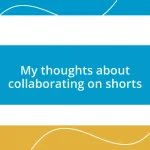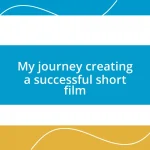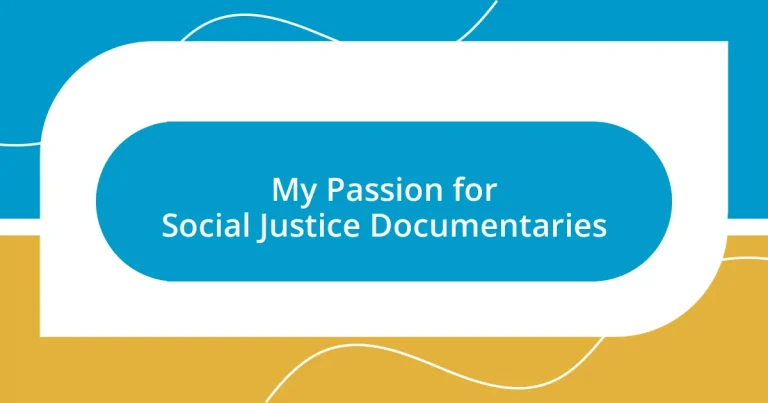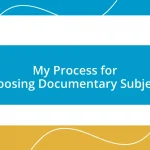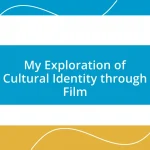Key takeaways:
- Understanding social justice issues is personal and requires active listening to affected voices, prompting self-reflection on one’s role in promoting equality.
- Documentaries serve as powerful tools for advocacy by evoking empathy, providing factual awareness, and inspiring viewers to take action on social issues.
- Community screenings and discussions enhance the impact of documentaries, fostering collective understanding and engagement in social justice dialogues.
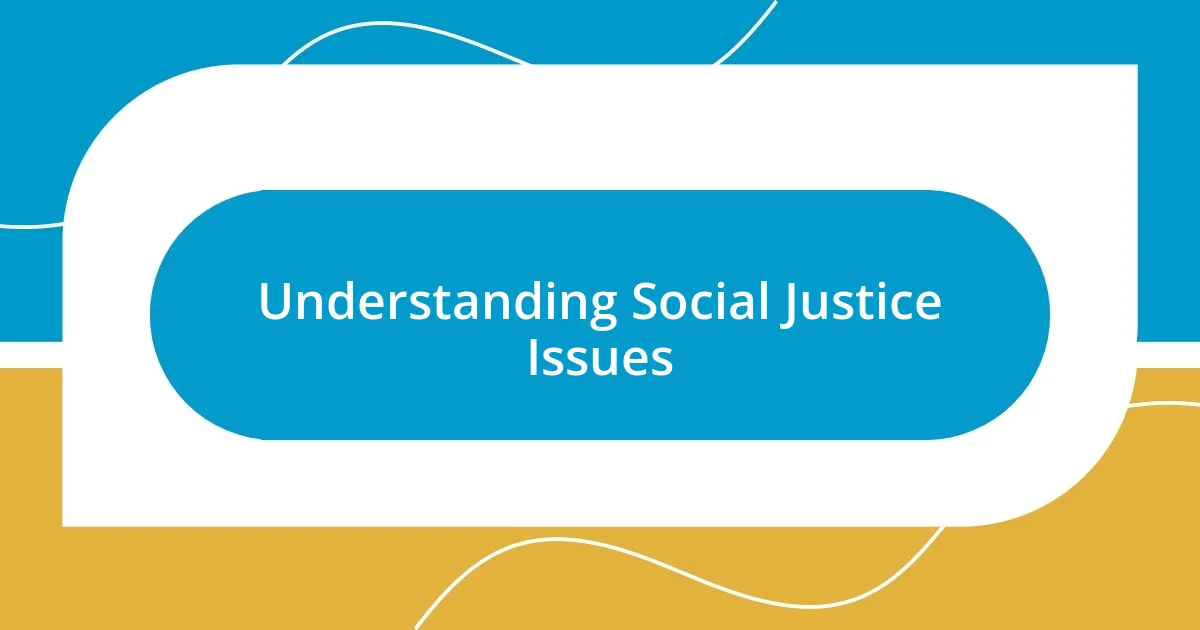
Understanding Social Justice Issues
Understanding social justice issues is essential for grasping the complexities of our society. I remember attending a community forum where individuals from different backgrounds shared their experiences with discrimination. It opened my eyes to how deeply systemic inequalities run and made me reflect: How often do we truly listen to the voices of those impacted?
These issues aren’t just abstract concepts; they resonate on a deeply personal level. I overheard a conversation between friends discussing police brutality, and it struck me how often we distance ourselves from hard truths. Ask yourself, how can we expect change if we don’t confront these realities head-on?
Moreover, watching documentaries that focus on social justice has been transformative for me. Each film pulls back the curtain on societal issues that are often silenced. They challenge me to consider: What role do I play in the fight for equality? This emotional connection fuels my passion and drives me to advocate for change, reminding me that understanding these issues is just the beginning.
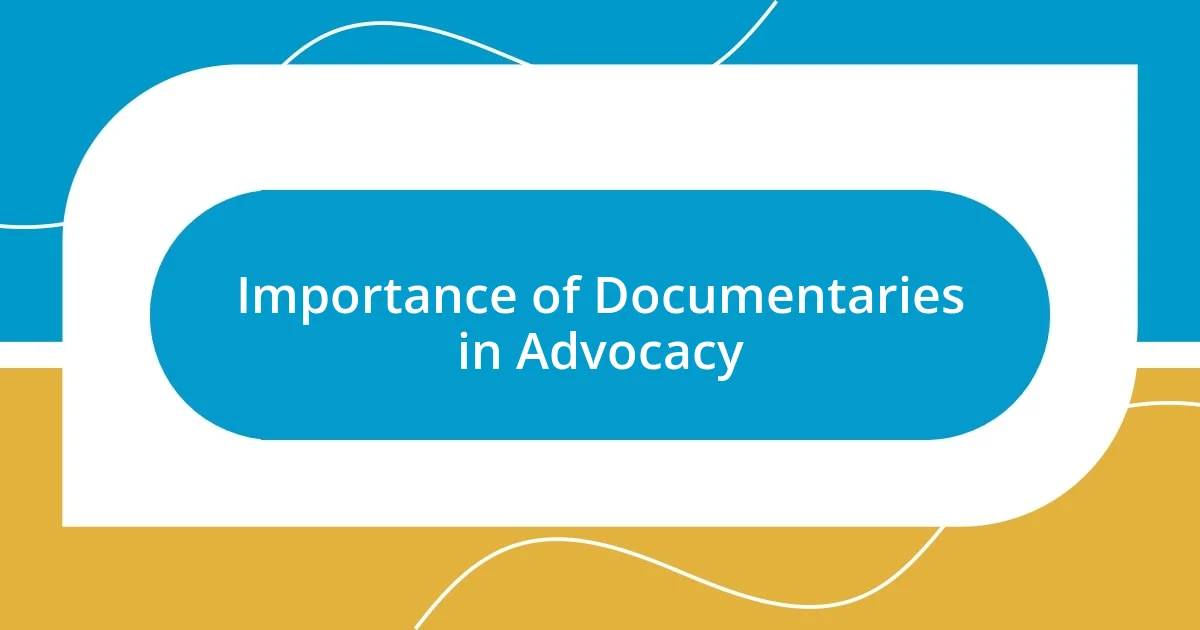
Importance of Documentaries in Advocacy
Documentaries play a crucial role in elevating advocacy efforts. I’ve often found myself glued to the screen, captivated by stories that spotlight injustices. A powerful documentary can spark something within us—a recognition that these issues are not far removed from our daily lives but are intricately woven into the fabric of our society. They inform, educate, and sometimes even compel us to take action.
Here are some reasons why documentaries are essential in advocacy:
- Emotional Engagement: They evoke empathy by humanizing social justice issues.
- Informed Awareness: Documentaries provide factual information, shedding light on hidden truths.
- Catalyst for Action: They inspire viewers to become advocates and supporters of various causes.
Reflecting on a documentary I watched about environmental racism, I realized how place and identity shape our experiences of injustice. It was an eye-opener, pushing me to actively engage in conversations and advocacy. I’ve started attending local meetings, eager to amplify the voices often overshadowed. It’s in these moments that I recognize just how powerful storytelling can be in driving social change—not merely through information, but through an authentic connection to the experiences of others.
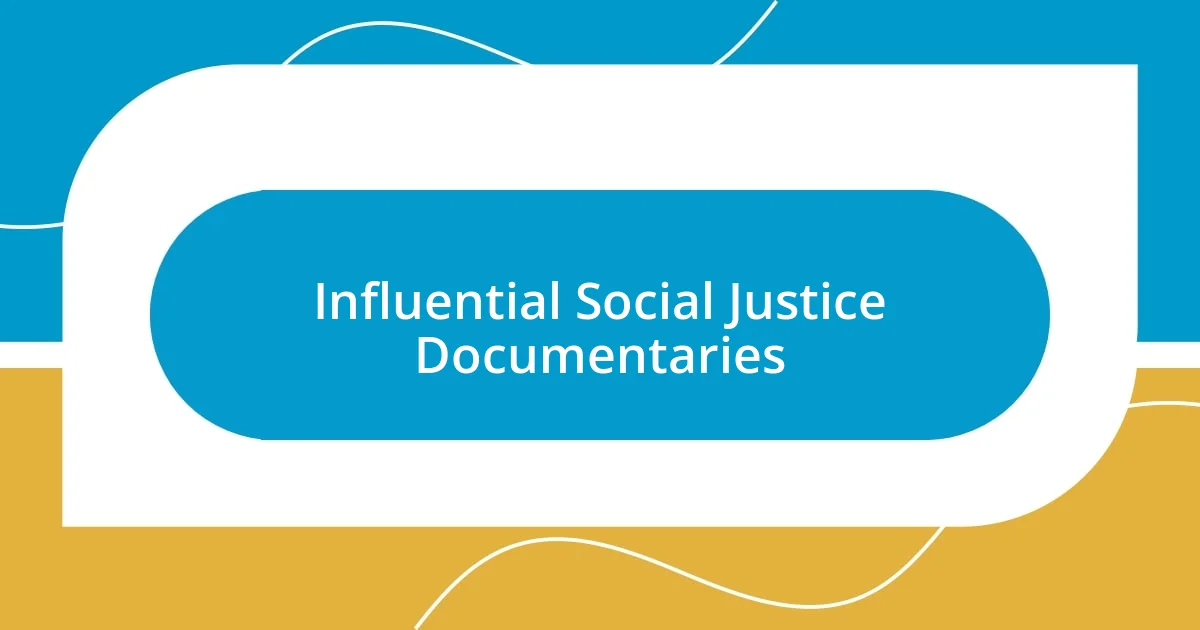
Influential Social Justice Documentaries
Some documentaries have profoundly shaped my understanding of social justice. One such influential film is “13th” by Ava DuVernay, which explores the intersection of race, justice, and mass incarceration in the United States. I remember sitting in my living room, stunned by the connections it drew between systemic racism and the prison system; it compelled me to dig deeper into history and question why these issues persist.
Another impactful documentary is “Won’t You Be My Neighbor?” about Fred Rogers and his advocacy for social justice through children’s television. Watching it, I felt a sense of nostalgia mixed with a new understanding of how kindness can serve as a form of activism. It reminded me that small, compassionate actions can create ripples of change in our communities.
“Invisible Man” is a standout for highlighting the struggles faced by individuals living under the weight of societal neglect. The emotional depth in the film resonated with me, sparking conversations with friends about the urgency of addressing mental health issues in marginalized communities. Reflecting on these films reminds me how important it is to keep our hearts open and our minds engaged in social justice dialogues.
| Documentary | Focus |
|---|---|
| 13th | Race, justice, and mass incarceration in the U.S. |
| Won’t You Be My Neighbor? | Kindness and social justice through children’s television |
| Invisible Man | Struggles of individuals in marginalized communities |
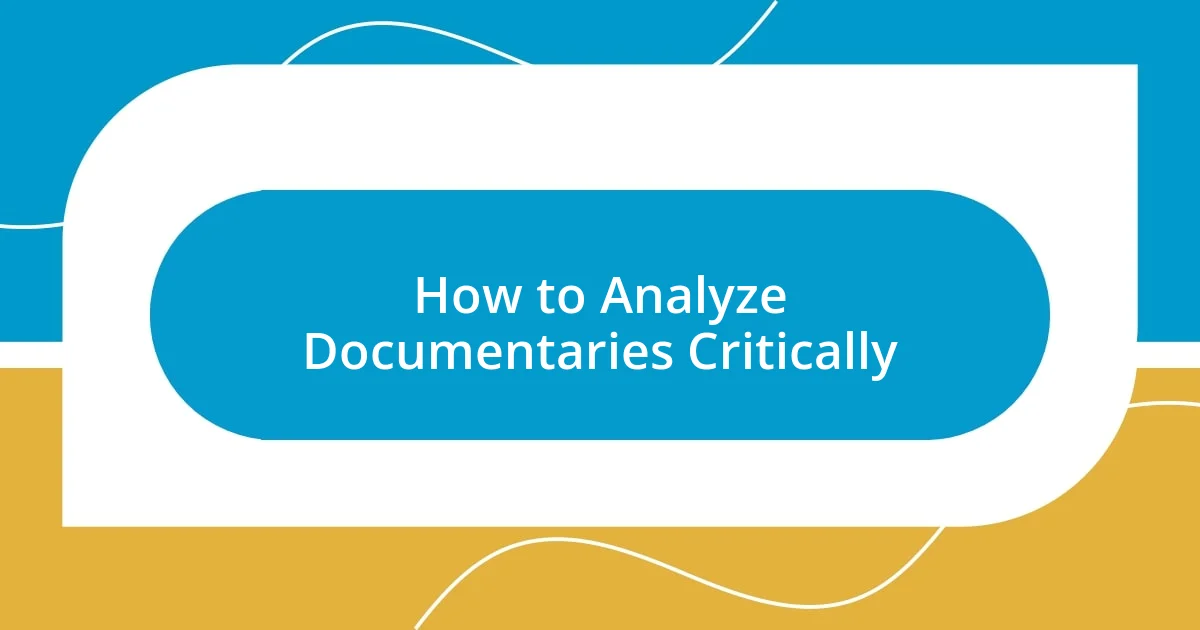
How to Analyze Documentaries Critically
To analyze documentaries critically, I believe it’s essential to focus on the filmmaker’s perspective. What is the point of view being represented? Documentaries often have inherent biases, influenced by the values and intentions of their creators. When I watched “The Act of Killing,” for example, I found myself questioning how the filmmakers’ choices shaped my understanding of the events depicted. This kind of scrutiny has helped me appreciate the complexities behind the storytelling.
Additionally, examining the use of visuals, sound, and narrative structure can reveal deeper meanings. I remember feeling particularly moved by the juxtaposition of bleak images and uplifting music in “He Named Me Malala.” This contrast amplified the emotional impact, making the core message about resilience and hope unforgettable. By asking myself how these elements affected my emotions, I engaged more profoundly with the film’s themes.
Lastly, I think it’s crucial to consider the documentary’s impact on viewers and society at large. Does it encourage dialogue about important issues? After watching “Won’t You Be My Neighbor?”, I found myself discussing Fred Rogers’ messages with friends, reflecting on how we might foster similar kindness in our interactions. It’s this kind of reflection that leads to a meaningful critique—asking not just what the documentary shows, but what it inspires in us.
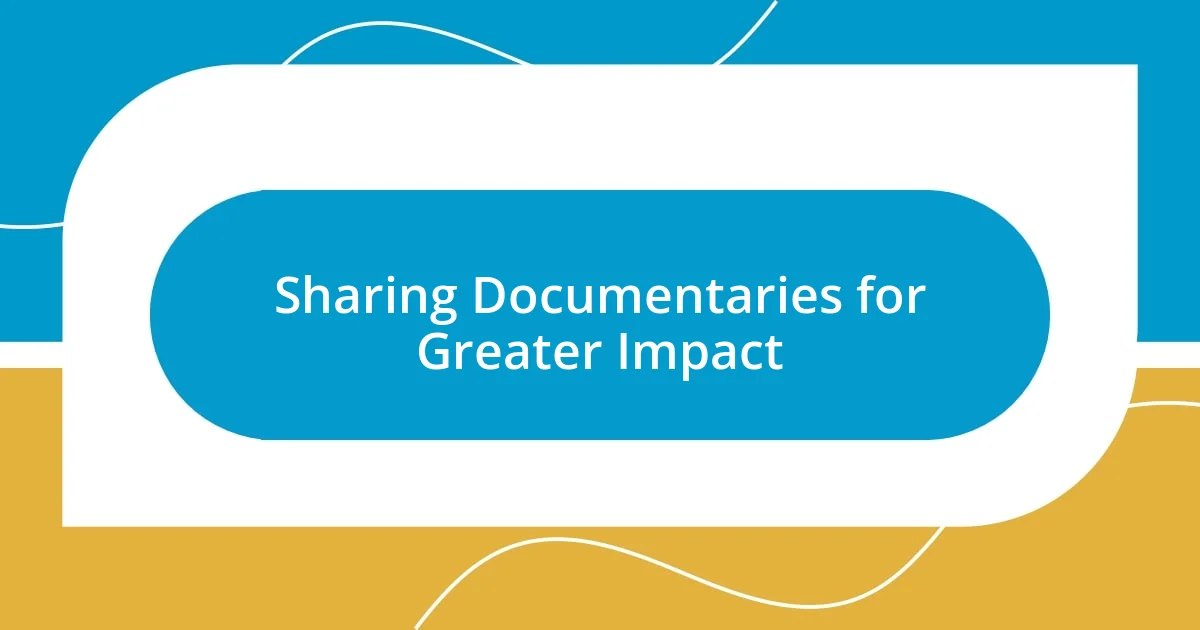
Sharing Documentaries for Greater Impact
Sharing documentaries widely magnifies their impact and fosters a collective understanding of social justice issues. I remember sharing “13th” with a group of friends during a movie night, and the discussions that followed were intense and enlightening. It was as if the film opened a door, allowing us to explore uncomfortable topics together, fostering empathy and a deeper grasp of systemic injustices.
Social media plays a pivotal role in the sharing process. I often find myself scrolling through platforms and stumbling upon powerful clips or insights from documentaries. This strategy not only sparks interest but also encourages viewers to watch the full films. Have you ever shared a documentary that sparked a conversation? I have, and the engagement it prompted showed me just how potent these films can be in mobilizing communities and forging connections based on shared values.
By hosting discussions or organizing screenings, we can turn comprehension into action. I once coordinated a small community event where we screened “Invisible Man” followed by a open dialogue. The vulnerability in those conversations illuminated the issues we face and built a supportive space for voices often unheard. It was a reminder that sharing these stories isn’t just about spreading information; it’s about nurturing a community ready to engage and advocate for change.
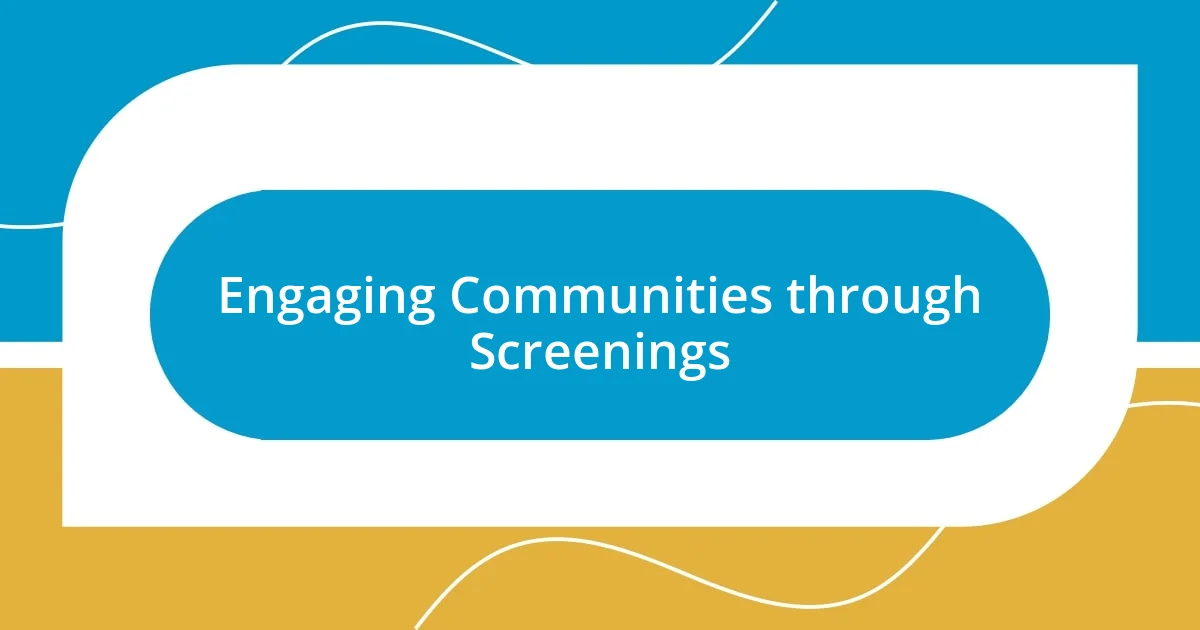
Engaging Communities through Screenings
When I think about the power of community screenings, I’m reminded of a local event I attended where we watched “The True Cost,” a documentary that delves into the fashion industry’s hidden realities. The atmosphere buzzed with anticipation, and as the credits rolled, the air felt charged with energy. People were eager to share their reactions, and it’s remarkable how one film can ignite discussions about consumerism, ethical choices, and sustainability in our everyday lives. Have you ever experienced a moment where a film changed the way you viewed the world around you? I have, and it truly shows the profound impact documentaries can have beyond the screen.
Organizing community screenings has been transformative for the groups I’ve participated in. After screening “The Act of Killing,” we created small breakout groups to foster deeper conversations about historical context and personal responses. I was struck by how engaged everyone was; it felt like we were peeling back layers of understanding together. Each participant shared stories from their own lives, linking the film’s themes to their experiences in ways I hadn’t anticipated. It’s amazing how documentaries can serve as a catalyst for collective reflection and healing, isn’t it?
I’ve also noticed that incorporating a Q&A session after a screening shapes the experience even further. During a screening of “Won’t You Be My Neighbor?”, we had a guest speaker who was a childhood educator. Their perspective added incredible depth to our discussions, and the dialogue became a fusion of personal anecdotes and professional insights. This blend of experience and information brought the issues to life, strengthening our community’s bonds while empowering us to act. I believe these moments remind us that every screening is a stepping stone towards greater awareness and social responsibility.





